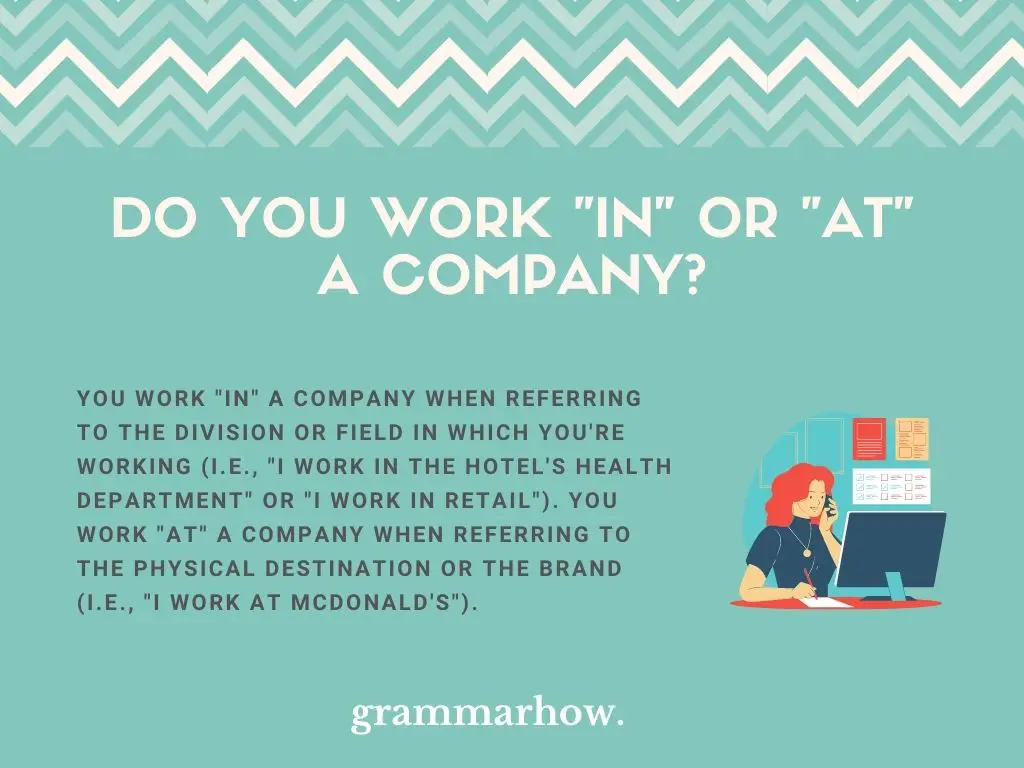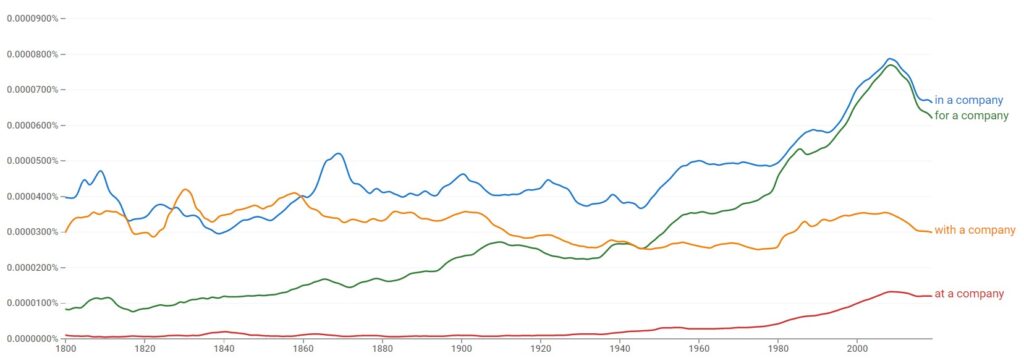The preposition after “work” changes the meaning somewhat, so it’s good to know which one to use for each case. This article will explore all potential prepositions while focusing mainly on “work in” and “work at.”
Do You Work “In” Or “At” A Company?
You work “in” a company when referring to the division or field in which you’re working (i.e., “I work in the hotel’s health department” or “I work in retail”). You work “at” a company when referring to the physical destination or the brand (i.e., “I work at McDonald’s”).

The two prepositions are synonymous with each other as well, though these are the most apparent meanings for them that it helps to follow.
Can “In A Company” And “At A Company” Be Used Interchangeably?
Generally, when we use similar prepositions like this, we’re met with an interchangeable possibility. That means while both prepositions offer a different meaning, we’re able to use them in the same way more often than we’re not. The same rules apply here.
We can use “in a company” and “at a company” interchangeably if we want to. They both work well. Generally, it depends on the context as to which one is more appropriate for the time.
- I work in a hotel.
- I work at a hotel.
This is just one case where the phrases are interchangeable. Both of these are correct, though, in this instance, it’s more likely to say “at a hotel.”
- I work in a real estate office’s HR department.
- I work at a real estate office’s HR department.
Again, both of these are correct. If we’re talking about a general place or building, both “in” and “at” are correct.
Sometimes, you do come across instances where the phrases are not interchangeable, like so:
- I work in McDonald’s.
- I work at McDonald’s.
“At” is the only correct case here because we’re talking about the actual brand of the company we work for.
- I work in finance.
- I work at finance.
This time, “in” is the only correct case because we’re talking about the field we work in.
Is It Correct To Say That You Work “For A Company”?
Of all the prepositions that work alongside “company,” there is one we have yet to mention. “For a company” is perhaps the most popular choice of them all and is the most versatile choice too.
If you work “for a company,” it can apply to any of the situations that work for “in” and “at.” You can work for a general company, a named company, for a specific department, or for a general field. It’s a versatile option.
Is It Correct To Say That You Work “With A Company”?
We might also come across the preposition “with” relating to our work habits. Again, this is a somewhat popular one, and it’s perhaps even more popular than “at.”
“With a company” works best when we’re talking about the company we work alongside. It usually comes with a name or a specific field of study.
“With a company” is more specific than “for a company,” though both options work well.
Which Preposition Is Used The Most With “Company”?
We think it’s time to combine all the prepositions to see which of them leads the pack in popularity. That way, you can find out which one is most common for native speakers to write about.
According to this graph, “in a company” and “for a company” are the most popular choices. They’re almost identical in popularity, while “with a company” is lower down, and “at a company” is the least popular choice.

“For a company” and “in a company” are the most versatile. That’s probably why they’re the most popular choices since they apply to most fields, and we can use them much easier than the other two.
Examples Of How To Use “In A Company”
“In a company” is one of the most popular prepositions to use. We use it to explain where we work in a more specific manner, though we don’t have to specifically name the brand or company we work for.
- I work in real estate, and I love it.
- He works in an office on the weekends.
- She works in a hotel.
- You work in a company that I hate.
- They work in a dodgy neighborhood.
We don’t simply have to use “company” when going through these examples. We think it makes more sense to show you the most appropriate variations to explain when “in” works best.
Examples Of How To Use “At A Company”
“At a company” is the least popular of the four prepositions. It’s used more generally than the other prepositions, and it only talks about a general location or thing that we work for.
- I work at a hotel because I like it.
- She works at the bakery.
- They work at the school together.
- We work at the Gap.
- He works at the factory all the time.
Examples Of How To Use “For A Company”
“For a company” is the other most popular preposition alongside “in a company.” It’s the most versatile choice because it applies to so many different areas.
- I work for McDonald’s.
- I work for my mother’s friend.
- He works for the offices up the road.
- You work for a computer company.
- They work for their own company.
Examples Of How To Use “With A Company”
“With a company” is somewhat popular and mostly relates to the company that you’re working alongside. We can also use it to refer to things we’re specifically using to complete our work.
- I work with children all the time.
- They work with a real estate office.
- He works closely with the mayor’s office.
- We work with the police.
- She works with me.
Which Preposition Should I Use With “Organization” And “Industry”?
“Organization” and “industry” are synonymous with “company.” Generally, all of the same prepositions apply in the same way. You should use each one based on what you’re talking about specifically.
- In: If you talk about the general organization or industry field you work in.
- At: If you name the organization or industry.
- For: You can use this in most cases, whether you name the organization or industry or whether you don’t.
- With: You can use this when working alongside an organization or industry.
You may also like:
I Worked vs. I Was Working vs. I Have Been Working – Difference Explained
Work In, On, At, Or With? Here’s The Difference (+24 Examples)
“Work On The Field” or “Work In The Field”?

Martin holds a Master’s degree in Finance and International Business. He has six years of experience in professional communication with clients, executives, and colleagues. Furthermore, he has teaching experience from Aarhus University. Martin has been featured as an expert in communication and teaching on Forbes and Shopify. Read more about Martin here.
